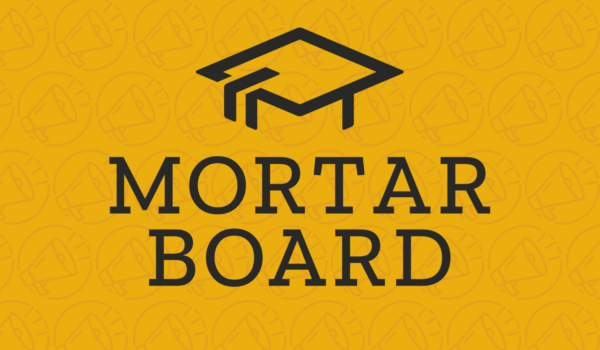The Emerging Job Market According to Marc Holcomb
By: Sarah Grace Smith

Marc Holcomb
In times of uncertainty and in the face of an unknown future, the job market can appear frightening. What will the work force look like after COVID-19? How can we prepare for it? Will Mortar Board membership help in the job search? Marc Holcomb, the Assistant Director for Professional Development at the University of Tennessee Chattanooga’s Center for Career and Leadership Development and the advisor of the Quadrangle chapter, helped answer these questions for us.
According to Marc, the search for employment has not changed as much as one would have expected. The biggest change is the switch to virtual formats. While career fairs and interviews can no longer be hosted in person, students can take the initiative and search online. Because of both the recession and the pandemic, most jobs are also online now. In the future, Marc predicts that any job that can be online will be in a virtual format for safety reasons and convenience. In-person jobs have already started to and will probably continue to take health and safety precautions such as requiring face masks, checking temperatures and maintaining social distancing practices.

In order to prepare for an ever-changing job market, Marc suggests focusing on developing skills. Employers have begun to seek applicants who can do the job rather than applicants who have a degree related to the job. These career skills can be developed by university’s career services and success centers within colleges. The Center for Career and Leadership Development at University of Tennessee Chattanooga, for example, offers university-wide as well as college-specific services. According to Marc, the biggest challenge universities face in terms of skills development is the ability to incorporate it into curriculum, as degrees which require academic rigor leave students less likely to take extra curriculars in career skills. However, universities and colleges across the country are taking measures and creating offices to help develop these skills before graduation.
One career skill often looked for by employers is leadership. Marc strongly believes that leadership is not necessarily a natural skill, but one that can be developed over time. The more opportunities to lead one has, the more leadership skills one can develop. Leadership does not always mean being the boss, but can also include giving advice to a friend, leading a group project or even leading by example in a social situation. Two types of people Marc believes have shown incredible leadership are clergy and politicians at all levels. People in these careers face criticism every day, and yet they continue in their roles because of their goal to make a difference in people’s lives. To Marc, that is what a leader should look like.

Marc with his chapter
After completing his first year as an advisor, Marc believes that Mortar Board is an excellent way to develop leadership and career skills. According to Marc, the type of people who pursue Mortar Board already have a leadership streak within them, but chapters provide leadership development opportunities as well as experience brainstorming among multiple leaders. Within the Quadrangle chapter, the meetings were set up very similar to meetings in the career world. Joining Mortar Board “almost guarantees growth,” as said by Marc. In addition to skills development, the entire alumni network can be used to help in the job search. He recommends using the network and contacting other Mortar Boards in your field.
This is a frightening time of unknowns, especially for those going into the workforce. But, as a Mortar Board, you have the skills to succeed. You are scholars dedicated to service and leadership, and you have a whole network of alumni ready to help. Find security in Mortar Board. Times may be changing, but the leadership experience, career skills and Mortar Board community you have at your fingertips will not.


